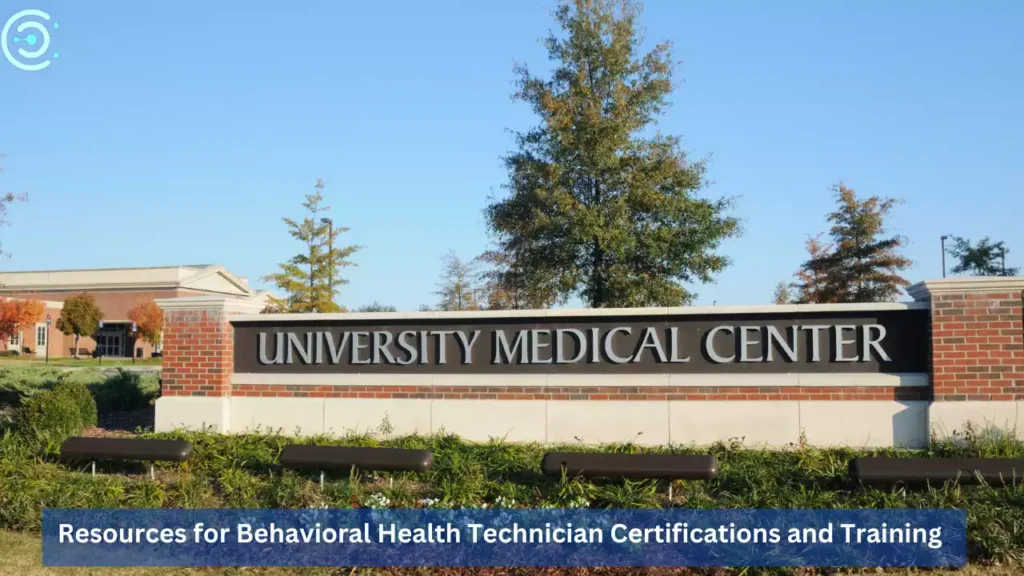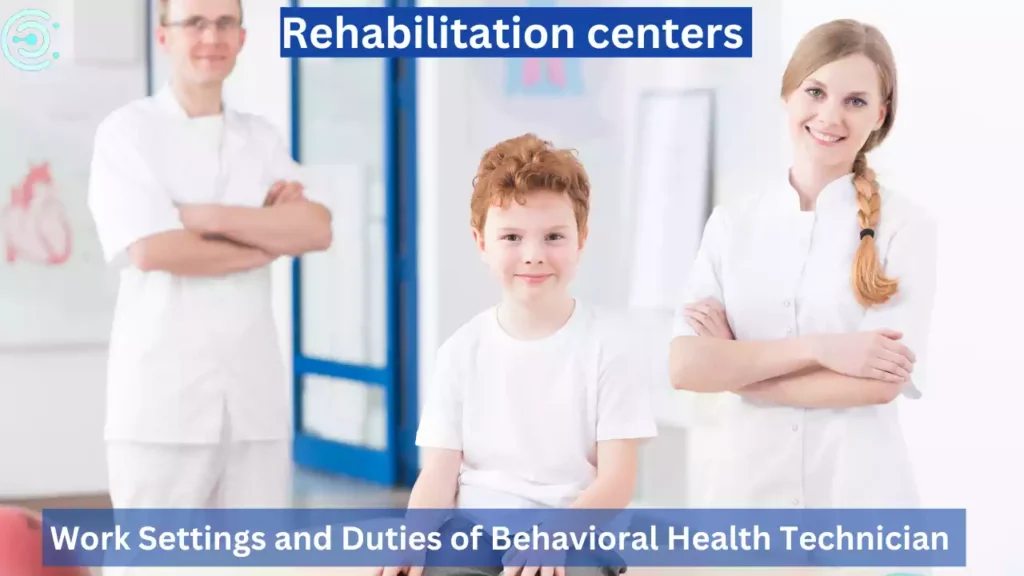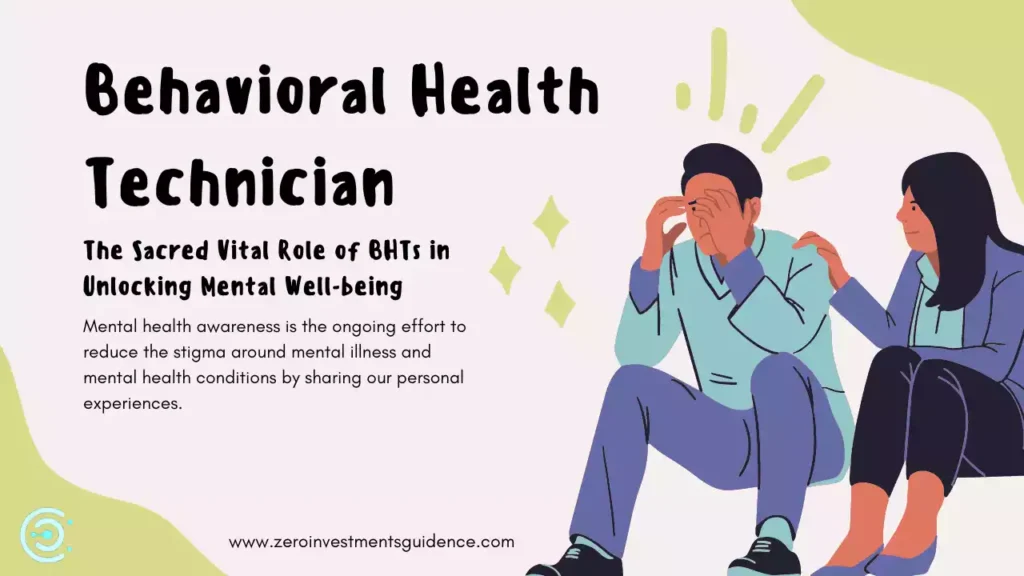In today’s society, the importance of mental health awareness and support has never been more evident. As individuals strive to navigate life’s challenges, the need for qualified professionals to assist them in their journey towards well-being becomes increasingly crucial. Enter the behavioral health technician, a dedicated individual who plays a pivotal role in the realm of mental health care.
Introduction to Behavioral Health Technician
A behavioral health technician (BHT), also known as a psychiatric technician or behavior technician, is a healthcare professional who works alongside licensed mental health professionals to provide care and support to individuals with mental health and/or substance abuse disorders. They play a crucial role in the behavioral health field, acting as a bridge between patients and therapists.
Key responsibilities of a BHT:
- Implementing treatment plans: They work under the supervision of psychiatrists, psychologists, therapists, and other mental health professionals to carry out individualized treatment plans for patients. This may involve activities like leading group therapy sessions, conducting psychosocial assessments, and teaching coping skills.
- Monitoring patient progress: Behavioral health technician (BHT)s closely observe patients’ behavior, mood, and overall well-being, documenting any changes and reporting them to the supervising mental health professional. This helps track progress and adjust treatment plans as needed.
- Providing emotional support: Behavioral health technician (BHT)s offer a listening ear and emotional support to patients, creating a safe and supportive environment for them to express their challenges and concerns. They also help patients connect with resources and support groups within the community.
- Ensuring safety and de-escalating situations: They play a vital role in maintaining a safe and secure environment for both patients and staff. This may involve de-escalating potentially volatile situations, intervening in self-harm attempts, and administering emergency first aid.
- Performing administrative tasks: Behavioral health technician (BHT)s also handle various administrative tasks, such as maintaining patient records, preparing reports, and scheduling appointments.
Overall, behavioral health technicians play a vital role in supporting individuals with mental health and substance abuse challenges. Their dedication, empathy, and essential skills contribute significantly to providing quality care and improving patient outcomes.
Importance of Behavioral Health Technician
Behavioral health technicians (BHTs) play a crucial role in not only providing direct care but also contributing to mental health awareness and addressing societal stigma. Here’s how:
1. Mental health awareness:
Direct interaction with diverse populations:
BHTs work with a wide range of individuals experiencing mental health challenges, exposing them firsthand to the realities and complexities of various mental illnesses. This firsthand experience allows them to:
- Educate others: They can share their knowledge and experiences with family, friends, and even other healthcare professionals, fostering understanding and empathy.
- Challenge misconceptions: Through their experiences, BHTs can debunk common myths and misconceptions surrounding mental health, promoting a more accurate and compassionate public perception.
- Advocate for resources: Their understanding of the needs of individuals with mental illness allows them to advocate for increased access to mental health services and resources within their communities.
Community outreach and education:
Many BHTs participate in community outreach programs, providing educational workshops and presentations on mental health topics. This helps to:
- Increase public awareness: By providing accurate information and dispelling myths, BHTs can contribute to a more informed and understanding community.
- Reduce stigma: Openly discussing mental health challenges in public forums can help normalize the experience and reduce the stigma associated with seeking help.
- Empower individuals: Educational programs can empower individuals to recognize signs and symptoms of mental health challenges in themselves and others, encouraging them to seek help sooner.
2. Addressing societal stigma:
Personal interaction and positive role models:
BHTs’ caring and supportive interactions with individuals experiencing mental illness can challenge negative stereotypes and demonstrate the positive impact of seeking help. They can serve as:
- Positive role models: BHTs who are open about their work and the positive impact they make can help break down stigma and encourage others to pursue careers in mental health.
- Empathetic representatives: By sharing their experiences and perspectives, BHTs can bridge the gap between the public and individuals with mental illness, fostering empathy and understanding.
Collaboration and advocacy:
BHTs often collaborate with other mental health professionals to advocate for changes in policies and practices that contribute to stigma. This may involve:
- Promoting parity in insurance coverage: Advocating for equal coverage for mental health and physical health can reduce the financial barriers to seeking help and contribute to de-stigmatization.
- Supporting anti-discrimination initiatives: Working to eliminate discriminatory practices against individuals with mental illness can foster a more inclusive and accepting society.
By playing these crucial roles, behavioral health technician (BHT)’s help to create a more informed, understanding, and supportive environment for individuals with mental health challenges, ultimately contributing to a society where mental well-being is valued and accessible to all.
Education and Training Requirements for Behavioral Health Technician
1. Academic Qualifications:
The minimum educational requirement to become a BHT varies depending on the state and specific employer. Here’s a breakdown:
- Minimum: A high school diploma or GED is the absolute minimum requirement in most states. However, this might limit your job opportunities and earning potential.
- Preferred: Most employers prefer candidates with an associate degree in Behavioral Health Technology, Mental Health Technician, or a related field. These programs typically:
♦ Take 2 years to complete.
♦ Cover topics like psychology, psychopathology, human development, crisis intervention, medication management, and ethical practices.
♦ May include clinical practicums for hands-on experience. - Advanced: While not always required, a bachelor’s degree in Psychology, Social Work, or a related field can open doors to specialized roles and better leadership opportunities.
2. On-the-job Training:
Regardless of academic qualifications, most BHT roles involve on-the-job training to familiarize you with specific facility policies, procedures, and client populations. This training typically covers:
- Specific treatment approaches: Learning the specific therapeutic modalities used in your workplace.
- Documentation and reporting: Mastering record-keeping and reporting procedures.
- De-escalation and crisis intervention techniques: Learning how to safely manage challenging situations.
- Emergency procedures: Understanding and practicing safety protocols for medical emergencies.
- Cultural competence: Developing skills to effectively work with diverse populations.
The best academic and training path depends on your career goals, preferred work setting, and state requirements. Research behavioral health technician (BHT) programs in your area, inquire about job requirements in your target settings, and explore certification options for your chosen career path.
Skills and Qualities of a Behavioral Health Technician
As per our experience we have identified three crucial skills and qualities for BHTs: empathy and compassion, communication skills, and patience and resilience. Let’s delve deeper into each:
1. Empathy and Compassion:
- Understanding and connecting: BHTs work with individuals experiencing diverse mental health challenges. Having the ability to understand these difficulties from their perspective, without judgment, is crucial.
- Emotional support: Creating a safe and supportive environment where patients feel heard and cared for is essential. Empathy allows BHTs to provide genuine emotional support and build trust with individuals seeking help.
- Motivation and engagement: When patients feel understood and cared for, they’re more likely to engage in treatment and work towards recovery. Empathy fuels a BHT’s ability to motivate and encourage positive change.
2. Communication Skills:
- Active listening: Effectively listening to understand patients’ thoughts, feelings, and experiences is vital for accurate assessment and providing appropriate support.
- Clear and concise communication: BHTs need to explain complex medical information and treatment plans in a way that patients understand, fostering trust and adherence to treatment.
- De-escalation and conflict resolution: BHTs often encounter challenging situations. Excellent communication skills are crucial for de-escalating conflicts, mediating disagreements, and ensuring everyone feels safe and heard.
- Collaboration: BHTs collaborate with other healthcare professionals, families, and caregivers. Clear and effective communication ensures coordinated care and better outcomes for patients.
3. Patience and Resilience:
- Progress takes time: Recovery from mental health challenges is rarely linear. Patience allows BHTs to celebrate small victories and support patients through setbacks without getting discouraged.
- Challenging situations: BHTs may encounter stressful and emotionally demanding situations. Resilience helps them bounce back, maintain composure, and continue providing effective care.
- Adaptability: Every patient and situation is unique. BHTs need to be adaptable, adjusting their approach as needed to best support each individual.
- Self-care: Working in mental health can be emotionally taxing. Resilience involves prioritizing self-care and maintaining a healthy work-life balance to avoid burnout.
Additional Skills and Qualities:
- Observational skills: Closely observing patients’ behavior and mood changes to inform assessments and interventions.
- Problem-solving skills: Utilizing critical thinking to identify issues, develop solutions, and navigate complex situations.
- Documentation skills: Accurately and efficiently recording patient information and progress notes.
- Teamwork: Collaborating effectively with other healthcare professionals to provide comprehensive care.
- Cultural competence: Understanding and respecting diverse cultural backgrounds and beliefs to provide culturally sensitive care.
By cultivating these skills and qualities, behavioral health technician (BHT)s can make a significant positive impact on the lives of individuals experiencing mental health challenges.
Resources for Behavioral Health Technician Certifications and Training

Certification Organizations:
- American Association of Psychiatric Technicians (AAPT): Offers the Certified Psychiatric Technician (CPT) credential, the most widely recognized BHT certification in the US. https://psychtechs.org/
- Florida Certification Board: Offers the Certified Behavioral Health Technician (CBHT) credential, which is specific to Florida but recognized in some other states. https://flcertificationboard.org/
- National Center for Certification in Addiction Treatment (NCCAT): Offers a variety of addiction-specific certifications, including the Certified Behavioral Health Technician – Substance Abuse (CBHT-SA). https://www.naadac.org/certification
Training Programs:
- Community colleges and technical schools: Many offer associate degree programs in Behavioral Health Technology or Mental Health Technician, which prepare students for BHT positions and certification exams.
- Universities: Some universities offer bachelor’s degree programs in related fields like Psychology or Social Work, which can also provide a strong foundation for a BHT career.
- Online training providers: Some organizations offer online BHT training programs, but be sure to choose a reputable program accredited by a recognized body.
Additional Resources:
- American Psychological Association (APA): Provides information on various mental health professions, including BHTs. https://www.apa.org/
- Substance Abuse and Mental Health Services Administration (SAMHSA): Offers resources for finding mental health and substance abuse treatment facilities, including those that employ BHTs. https://www.samhsa.gov/
- National Alliance on Mental Illness (NAMI): A leading mental health advocacy organization that provides information and support for individuals and families affected by mental illness. https://www.nami.org/Home
Important Tips:
- Check requirements: Research the specific certification and training requirements in your state or desired work setting.
- Accreditation: Ensure your chosen program is accredited by a reputable organization.
- Cost and length: Consider the program’s cost, length, and flexibility to fit your needs and budget.
- Reputation: Research the program’s reputation and student reviews.
- Career counseling: Seek career counseling from experienced professionals to explore your options and make informed decisions.
Remember, choosing the right resources for your behavioral health technician (BHT) career path depends on your individual goals, preferences, and location. Don’t hesitate to reach out to program directors, certification organizations, or career counselors for further guidance.
Behavioral Health Technician Salary

The average salary for a Behavioral Health Technician (BHT) in the United States varies depending on several factors, including:
- Location: Salaries tend to be higher in larger cities and coastal areas compared to rural areas.
- Experience: BHTs with more experience typically earn more than those with less experience.
- Education: BHTs with bachelor’s degrees may earn more than those with associate’s degrees.
- Certification: Having relevant certifications can boost earning potential.
- Employer: Salaries can vary depending on the type of employer, such as private practice, hospital, or community clinic.
National Average:
- As of February 2024, the national average salary for BHTs is around $32,500, according to ZipRecruiter. However, this is just an average, and the actual range can be quite broad, from $15,625 to $46,000 per year.
Regional Variations:
Here’s a breakdown of the average BHT salary by region, based on ZipRecruiter data:
- Northeast: $37,000
- Mid-Atlantic: $34,000
- South: $31,000
- ** Midwest:** $32,000
- West: $35,000
Specific State Examples:
- California: $33,910
- Texas: $32,125
- New York: $37,840
- Florida: $25,202
- Pennsylvania: $33,900
These are just average figures of behavioral health technician (BHT), and individual salaries can vary significantly based on the factors mentioned above. Researching salary data in your specific location and desired work setting can provide a more accurate picture of what you might expect to earn.
Career Opportunities and Advancement for Behavioral Health Technician

We’ve identified two key areas for BHTs to advance their careers: further education and specializations. Let’s explore these in detail:
1. Further Education Options:
- Associate’s degree: While an associate’s degree is the minimum qualification in most places, pursuing a bachelor’s degree in a related field like Psychology, Social Work, or Nursing can open doors to supervisor roles, management positions, and even entry-level positions in therapy or counseling.
- Master’s degree: A master’s degree in Psychology, Counseling, or Social Work opens opportunities for advanced clinical practice, specialized therapy modalities, and leadership positions in mental health agencies.
- Certification programs: Earning certifications like the Certified Behavioral Health Technician (CBHT) or Certified Addiction Counselor (CAC) demonstrates advanced knowledge and commitment to the field, potentially boosting employability and earning potential.
2. Specializations:
- Substance abuse treatment: Specialization in addiction treatment opens doors to work in rehabilitation centers, detox facilities, and outpatient programs for individuals struggling with substance use disorders.
- Child and adolescent mental health: Specialization in child and adolescent mental health allows BHTs to work in school-based clinics, pediatric hospitals, and community mental health agencies serving children and teenagers.
- Geriatric mental health: Specialization in geriatric mental health equips BHTs to work with older adults experiencing depression, dementia, and other age-related mental health challenges.
- Trauma-informed care: Specialization in trauma-informed care prepares BHTs to work with individuals who have experienced trauma, ensuring sensitive and supportive care.
- Specific therapeutic modalities: Training in specific therapy modalities like Cognitive Behavioral Therapy (CBT) or Dialectical Behavior Therapy (DBT) can enhance BHTs’ skillset and career prospects.
Remember, the specific career path and advancement opportunities for behavioral health technician (BHT)s depend on individual goals, interests, and educational qualifications. Researching available options, seeking mentorship, and actively pursuing professional development are key to navigating your career journey in this rewarding field.
Work Settings and Duties of Behavioral Health Technician
Behavioral Health Technicians (BHTs) play a vital role in supporting individuals with mental health and substance abuse challenges across various settings. Their duties involve providing direct care, implementing treatment plans, monitoring patient progress, and ensuring a safe and supportive environment. Let’s explore some common work settings for BHTs and their specific duties in each:
1. Hospitals:
Psychiatric units:
BHTs work alongside psychiatrists, nurses, and other mental health professionals to provide direct care to patients experiencing acute mental health crises. They may assist with:
- Monitoring vital signs and behavior
- Implementing treatment plans
- Providing emotional support and de-escalating situations
- Assisting with medication administration
General medical/surgical units:
BHTs might provide support to patients with co-occurring mental health conditions or emotional distress during hospitalization. They may:
- Offer emotional support and companionship
- Help patients connect with mental health resources
- Educate patients and families about mental health conditions
2. Rehabilitation centers:

Substance abuse treatment facilities: BHTs assist individuals with substance use disorders by:
- Monitoring progress and adherence to treatment plans
- Leading group therapy sessions
- Providing individual counseling and support
- Teaching coping skills and relapse prevention strategies
Mental health rehabilitation facilities: BHTs support individuals with chronic mental health conditions by:
- Assisting with daily living activities
- Teaching independent living skills
- Providing social and emotional support
- Connecting patients with community resources
3. Community health organizations:

Outpatient clinics:
BHTs work with therapists and counselors to provide individual and group therapy to patients with various mental health concerns. They may:
- Conduct initial assessments
- Prepare treatment plans
- Document patient progress
- Coordinate care with other providers
Home-based services:
BHTs provide support to individuals with mental health challenges in their homes. They may:
- Assist with medication management
- Teach coping skills and stress management techniques
- Connect patients with community resources
- Provide support to families and caregivers
Additional Work Settings:
- Schools: BHTs work with school counselors and psychologists to support students with emotional and behavioral challenges.
- Correctional facilities: BHTs provide mental health services to incarcerated individuals.
- Private practices: Some BHTs work in private practices alongside psychiatrists, therapists, and counselors.
Remember, the specific duties of a behavioral health technician (BHT) may vary depending on the work setting, employer, and their level of experience and training.
Daily Responsibilities of a Behavioral Health Technician
We’ve identified three key responsibilities for behavioral health technician (BHT)s, and I can expand on them as well as share other important aspects of their daily work:
1. Assisting with Therapy Sessions:
BHTs often play a supportive role in individual, group, and family therapy sessions led by licensed therapists. This may involve:
- Preparing materials and activities for the session.
- Welcoming and supporting patients during the session.
- Observing patient behavior and interactions.
- Taking notes and documenting observations.
- Assisting the therapist with specific interventions or activities.
- Following up with patients after the session, if needed.
2. Monitoring Patient Progress:
BHTs are responsible for closely monitoring the progress of patients under their care. This includes:
- Tracking vital signs and physical health indicators.
- Monitoring mood, behavior, and symptoms.
- Administering and recording assessments.
- Documenting changes in behavior, mood, and symptoms.
- Reporting any concerns or changes to the supervising healthcare professional.
3. Collaborating with Healthcare Professionals:
BHTs work within a multidisciplinary team to provide comprehensive care to patients. This involves:
- Communicating effectively with psychiatrists, therapists, nurses, social workers, and other healthcare professionals.
- Sharing observations, assessments, and progress reports.
- Participating in team meetings and case discussions.
- Coordinating care and interventions across different disciplines.
- Collaborating with family members and caregivers, as appropriate.
Additional Daily Responsibilities:
- Providing emotional support and crisis intervention.
- De-escalating volatile situations and ensuring patient safety.
- Educating patients and families about mental health conditions and treatment options.
- Maintaining accurate and confidential patient records.
- Adhering to ethical and professional standards of practice.
Remember, the specific daily responsibilities of a BHT can vary depending on several factors, including:
- Work setting: Hospital, rehabilitation center, community clinic, etc.
- Patient population: Adults, children, adolescents, specific diagnoses.
- Level of experience and training: New graduate, certified BHT, specialized program completion.
- Employer policies and procedures.
Challenges Faced by Behavioral Health Technician
Behavioral health technician (BHT)s face several unique challenges within their demanding and rewarding career. Let’s dive deeper into the two you mentioned and explore others they might encounter:
1. Emotional Toll:
- Exposure to trauma and suffering: Working with individuals struggling with mental health and substance abuse challenges often exposes BHTs to difficult experiences and stories of trauma. This can take an emotional toll, leading to compassion fatigue, secondary traumatic stress, and burnout.
- Managing personal boundaries: Building therapeutic relationships requires empathy and connection, but maintaining appropriate professional boundaries is crucial. Navigating this balance can be emotionally challenging, especially when dealing with complex or manipulative patients.
- Self-care and support: Balancing the emotional demands of the job with personal well-being is essential. Unfortunately, access to mental health resources, support groups, and debriefing opportunities can be limited, increasing the risk of emotional strain.
2. Limited Resources:
- Staffing shortages: The high demand for mental health services often outpaces available professionals, resulting in understaffing and increased workload for BHTs. This can lead to rushed interactions, less time for individual attention, and difficulty meeting all patient needs.
- Financial constraints: Budget limitations in healthcare facilities can restrict access to essential resources like equipment, training opportunities, and support staff. This can hinder BHTs from providing optimal care and implementing evidence-based treatment practices.
- Lack of cultural competence: Limited access to training and resources for culturally competent care can be a barrier to effectively serving diverse patient populations. This can result in communication difficulties, misunderstandings, and less effective treatment outcomes.
Additional Challenges:
- Physical safety: BHTs may occasionally encounter potentially violent or aggressive behavior from patients, requiring them to remain calm and prioritize safety in challenging situations.
- Career advancement: Opportunities for promotion and career development may be limited compared to other healthcare professions, requiring additional effort and initiative to progress in the field.
- Public perception: BHTs sometimes face misconceptions about their role and capabilities, requiring constant advocacy and education to raise awareness and understanding of their crucial contributions.
Despite these challenges, behavioral health technician (BHT)s play a vital role in the mental health field and find immense satisfaction in supporting individuals on their journey towards recovery. Strong support systems, self-care practices, and ongoing professional development can help BHTs navigate these challenges and thrive in their rewarding careers.
Present Status and Need of Behavioral Health Technician in the USA
Growing Demand:
The demand for BHTs is projected to grow significantly, exceeding the average growth rate for all occupations (8%) between 2022 and 2032, according to the Bureau of Labor Statistics (BLS). This growth is driven by several factors, including:
- Increasing awareness of mental health: More people are seeking help for mental health challenges, leading to a higher demand for mental health services.
- Aging population: As the population ages, the need for mental health services, particularly for geriatric populations, is expected to rise.
- Increased access to mental health care: Expanding insurance coverage and mental health parity laws are making mental health services more accessible, leading to an increase in demand for qualified professionals.
Current Challenges:
Despite the projected growth, the current supply of BHTs is not enough to meet the demand. This shortage is partly due to:
- Limited educational programs: Although educational programs for BHTs are growing, they still cannot keep up with the increasing demand.
- Competition for talent: BHTs often face competition for jobs from other healthcare professionals with similar skillsets.
Low salaries: Compared to other healthcare professions, BHT salaries can be lower, which can deter potential candidates. - Limited career advancement opportunities: While advancement paths exist, they may not be as clearly defined as in other fields, discouraging some individuals.
Impact of the Shortage:
The shortage of BHTs can negatively impact patient care, leading to:
- Longer wait times for appointments and services.
- Increased workloads for BHTs and other mental health professionals, potentially compromising quality of care.
- Limited access to specialized services in certain areas due to staffing shortages.
Addressing the Need:
Several initiatives are underway to address the BHT shortage, including:
- Expanding educational programs: More colleges and universities are offering BHT programs to increase the pipeline of qualified professionals.
- Increasing financial aid and scholarships: Making BHT education more affordable can attract more candidates.
- Promoting the profession: Raising awareness of the BHT role, its importance, and career opportunities can attract potential candidates.
- Improving working conditions and salaries: Investing in competitive salaries, benefits, and career advancement opportunities can make the BHT profession more attractive and retain experienced professionals.
Additional Resources:
- American Association of Psychiatric Technicians (AAPT): https://psychtechs.org/
- National Alliance on Mental Illness (NAMI): https://www.nami.org/Home
- Substance Abuse and Mental Health Services Administration (SAMHSA): https://www.samhsa.gov/
Final Thoughts on Behavioral Health Technician
Behavioral Health Technicians (BHTs) play a crucial and multifaceted role in the mental health field. They provide essential support, care, and interventions to individuals experiencing mental health and substance abuse challenges, contributing significantly to their recovery and well-being.
Here are some key conclusions about BHTs:
Impact:
Individual level: BHTs make a positive impact on individual patients by:
- Providing direct care and emotional support.
- Monitoring progress and advocating for their needs.
- Assisting with therapy and implementing treatment plans.
- Connecting them with community resources and support systems.
- Community level: BHTs contribute to greater community well-being by:
- Raising awareness about mental health and reducing stigma.
- Advocating for increased access to quality mental health services.
- Promoting holistic well-being by addressing social determinants of mental health.
Skills and Qualities:
BHTs require a diverse set of skills and qualities, including:
- Empathy and compassion for understanding patients’ experiences.
- Strong communication and interpersonal skills for building rapport.
- De-escalation and conflict resolution skills to handle challenging situations.
- Patience and resilience to navigate demanding work environments.
- Observational skills for monitoring patient progress and behavior.
- Culturally competent care to respect diverse backgrounds and beliefs.
Career Path:
BHTs have a promising career path with opportunities for:
- Advancement through further education, certifications, and specializations.
- Diverse work settings like hospitals, community clinics, and rehabilitation centers.
- Personal and professional growth in a rewarding field that makes a real difference.
Challenges:
BHTs also face certain challenges, including:
- Emotional toll of working with trauma and suffering.
- Limited resources and staffing shortages.
- Public misconceptions about their role and capabilities.
- Balancing self-care and well-being within a demanding profession.
Overall, behavioral health technician (BHT)s are essential members of the mental health workforce, making a significant contribution to improving the lives of individuals and communities. They are dedicated, skilled, and compassionate professionals who deserve recognition and support for their vital role in promoting mental health well-being for all.
FAQs
Q. What is the difference between a behavioral health technician and a psychiatrist?
A. While both professionals work in the field of mental health, psychiatrists are medical doctors who can prescribe medication, whereas behavioral health technicians focus on providing support and assistance in therapeutic settings.
Q. What are some common misconceptions about behavioral health technicians?
A. One common misconception is that behavioral health technicians only work with individuals with severe mental illness. In reality, they provide support to individuals across a wide range of mental health concerns.
Q. Can behavioral health technicians work independently, or do they always require supervision?
A. While behavioral health technicians often work under the supervision of licensed professionals, some may have the opportunity to work independently depending on their level of training and experience.
Q. What are some strategies for coping with the emotional challenges of being a behavioral health technician?
A. Engaging in self-care activities, seeking support from colleagues or supervisors, and practicing mindfulness techniques can all be helpful in managing the emotional toll of this profession.
Q. Are there opportunities for advancement in the field of behavioral health technology?
A. Yes, behavioral health technicians can pursue further education and training to advance their careers, including obtaining licensure or certification in specialized areas of practice.


This asset is incredible. The radiant data displays the maker’s earnestness. I’m dumbfounded and expect more such fabulous presents.
Wow, incredible blog format! How long have you ever been blogging for?
you make blogging glance easy. The entire glance of your web site
is magnificent, as well as the content! You can see similar:
najlepszy sklep and here
najlepszy sklep
Абсолютно актуальные новинки модного мира.
Все события известнейших подуимов.
Модные дома, лейблы, высокая мода.
Приятное место для модных хайпбистов.
https://rftimes.ru/news/2024-07-05-teplye-istorii-brend-herno